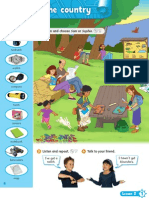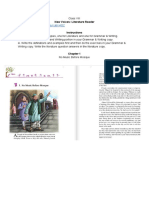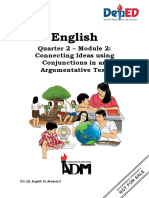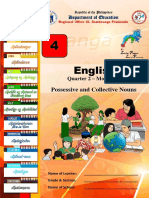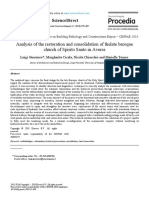Determiners Class 9
Determiners Class 9
Uploaded by
Subhash AryaCopyright:
Available Formats
Determiners Class 9
Determiners Class 9
Uploaded by
Subhash AryaOriginal Title
Copyright
Available Formats
Share this document
Did you find this document useful?
Is this content inappropriate?
Copyright:
Available Formats
Determiners Class 9
Determiners Class 9
Uploaded by
Subhash AryaCopyright:
Available Formats
What Are Determiners?
Determiners are words that appear before nouns and provide context related to
their quantity, definiteness, or ownership. Think of them as the “preview” before the noun takes
the stage. Here are some examples:
1. Articles:
o Definite Article (the): Refers to a specific noun. For example: “The painting on the left is our
favorite.”
o Indefinite Articles (a, an): Refer to nonspecific nouns. For instance: “She bought three boxes of
pasta.”
2. Demonstrative Determiners (or Demonstrative Adjectives):
o These indicate placement in space or time:
This: “This cat is the one I was telling you about.”
That: “Let’s go to that restaurant again.”
These: “We can’t see the lake because of these trees.”
Those: “In those days, Enid wore a lot of bright colors.”
3. Distributive Determiners:
o Refer to groups or individual parts within a group:
Each: “Each student received a book.”
Every: “Every morning, I go for a walk.”
All: “He ate all the cookies.”
Both: “They attended both concerts.”
4. Possessive Determiners (or Possessive Adjectives):
o Show ownership:
My, your, his, her, its, our, their: “This is my book.”
5. Quantifying Determiners and Numbers:
o These include words like many, few, several, some, any, all, much, little, enough, and numerical
expressions:
“I have gone to see that movie several times.”
“She has enough patience to deal with difficult customers.”
“He bought five apples.”
Exercise Time!
Now, let’s put your knowledge into practice. Here’s a quick exercise:
Fill in the blanks with the appropriate determiner:
1. She has read ___ interesting book about ancient civilizations.
2. ___ students in our class are participating in the science fair.
3. ___ of the children enjoyed the puppet show.
4. I need ___ more time to finish this project.
5. ___ new employees will join the team next week.
Exercise 1: Complete the sentences with the right determiners.
Complete the sentences given below with the suitable determiners given in brackets.
1. Meg used ___ sketch pens to complete her project. (this/these)
2. I had ___ rice today. (enough/all)
3. ___ picture was painted by Picasso. (that/those)
4. The book belongs to ___. (her/hers)
5. Can you give me ___ notebook? (the/an)
6. Sam stood ____ in the class. (first/one)
7. Mave is ___ honest man. (a/an)
8. ___ students were called to the principal’s office. (any/some)
9. Do you know ___ scarf this is? (whose/their)
10. ___ Qutub Minar belongs to the Sultanate Period in India. (an/the)
11. __ box of chocolates belongs to Rachel. (these/that)
12. Is there ___ food left in the fridge? (many/any)
13. Can I get ___ hot bowl of soup? (a/an)
14. There aren’t ___ boys in the park. (some/any)
15. Freya got ___ beautiful souvenir from Paris. (a/an)
Exercise 2: Fill the blanks with right determiners
Read the passage and fill in the blanks with appropriate determiners.
Once upon __ time, there lived __ king who was known for __ judgements. One day
___ women came holding __ baby, and both claimed they were __ mothers. Both
women were crying hard for __ baby, and __ king was finding it difficult to believe who
was saying ___ truth. So ___ king asked ___ guards to cut ___ baby in half and give
___ half to both ___ women. ___ woman who was holding __ baby accepted ___
decision whereas ___ other woman started begging ___ king to give ___ baby to the
other woman. Seeing ___, the king immediately understood who __ real mother was.
The king said that __ real mother would never let __ harm befall on __ child, and that is
why the second woman asked to give away the child to the first woman. She did not
want any harm on __ child and would rather give the baby away to someone else.
Finally __ king gave __ baby to __ real mother.
Frequently Asked Questions
Q1
What are determiners?
Determiners are those words that precede a noun to refer to something particular/specific. For example, “Those
books are old.” Here, ‘those’ is a determiner as it refers to something specific, i.e. the ‘books’.
Q2
Do articles come under determiners?
Yes, the articles (a/an/the) are considered to be determiners.
Types of Determiners
1. Articles: Articles are a type of determiner that specify definiteness or indefiniteness of a noun.
There are two articles in English: “the” (definite article) and “a/an” (indefinite articles).
2. Demonstratives: Demonstrative determiners indicate the proximity or distance of a noun in relation
to the speaker or listener.Examples: “this,” “that,” “these,” “those”
3. Possessives: Possessive determiners indicate possession or ownership of a noun.Examples: “my,”
“your,” “his,” “her,” “its,” “our,” “their”
4. Quantifiers: Quantifier determiners specify the quantity or amount of a noun. Examples: “some,”
“any,” “many,” “few,” “several,” “all,” “none,” “each,” “every,” “both,” “either,” “neither”
5. Numerals: Numerals are determiners that express numbers or numerical order. Examples: “one,”
“two,” “three,” “first,” “second,” “third,” etc.
6. Interrogatives: Interrogative determiners are used to ask questions about a noun. Examples:
“which,” “what,” “whose”
7. Distributives: Distributive determiners indicate individual members of a group or distribute the noun
among several entities.Examples: “each,” “every,” “either,” “neither”
8. Predeterminers: Predeterminers precede other determiners and modify their meaning by
expressing a specific quantity or amount. Examples: “half,” “both,” “all,” “twice”
Exercise Set 1: Identifying Determiners
a. Identify the determiners in the following sentences:-
1. Their house is bigger than hers.
2. Every student must complete his or her homework.
3. Many people believe that money can’t buy happiness.
4. The cat chased its tail.
5. Some birds migrate long distances each year.
6. Every morning, I take my dog for a walk.
7. Some of the cookies were missing from the jar.
8. That dress looks beautiful on you.
9. The children need to clean their rooms.
10. All the players on the team were exhausted after the game.
11. Several people have recommended that restaurant to me.
12. Few politicians are trusted by the public these days.
13. Each member of the group received a prize.
14. Her performance was the best in the entire competition.
15. A little kindness can go a long way.
16. The flowers in this garden are the most beautiful I’ve ever seen.
17. Both my parents are teachers.
18. Any student who did not finish the test can stay after school.
19. This is the only chance we have to see the exhibit.
20. These are the same shoes I wanted to buy.
21. Can you please deliver those novels I left in the yard?
22. These are some of my chickens.
23. We welcomed a few co-workers to our home for a cookout.
24. Every one of my groupmates knows my anniversary, but none of them sincerely wish me.
25. What credentials do you really have?
b. Fill in the blanks with the correct determiners:-
1. Can you pass me ____ salt, please?
2. I don’t have ____ idea why she left the party so early.
3. ____ children are playing in the park.
4. She hasn’t got ____ money left after buying the car.
5. ____ of the students in the class passed the exam.
6. ____ apple a day keeps the doctor away.
7. I would like to buy ____ new shoes, but I can’t afford them right now.
8. ____ books on the shelf are covered in dust.
9. He drank ____ water he could find because he was so thirsty.
10. They brought ____ own snacks to the movie.
11. ____ peasant is plowing the field.
12. ____ are some of my school pals.
13. ____ cat is a descendant of one of ____ rare breeds.
14. ____ is my issue, and I am equipped to handle this.
15. ____ marker is this?
16. ____ countries want to be self-reliant.
17. I saw ____ adverse event of ____ vehicle.
18. ____ are dogs.
19. ____ household is a cheerful bunch.
20. They have ____ fans on Instagram.
21. I have ____ brothers and one sister.
22. She wants to travel around ____ world.
23. ____ of my friends are planning to study abroad.
24. ____ time we spend together is precious.
25. Could you please give me ____ information about the tour?
You might also like
- Dain-5 AccessBodyProcessesIntroducedandExplained PDFDocument5 pagesDain-5 AccessBodyProcessesIntroducedandExplained PDFRiitta Knuuti95% (19)
- Explorers 3 INGLESDocument8 pagesExplorers 3 INGLESAntonia Ramos CasalNo ratings yet
- Unit 5 Articles - Quantifiers PDFDocument17 pagesUnit 5 Articles - Quantifiers PDFBussayaNo ratings yet
- Kinds of PronounsDocument6 pagesKinds of PronounsmanojboaNo ratings yet
- Module: Adjectives, Kinds of Adjectives, Order of Adjectives ObjectivesDocument10 pagesModule: Adjectives, Kinds of Adjectives, Order of Adjectives ObjectivesYamini KumarNo ratings yet
- Determiners For Class 8Document7 pagesDeterminers For Class 8Priyanshi Verma0% (1)
- Soal Ujian Tengah SemesterDocument2 pagesSoal Ujian Tengah SemesterOrigami lipatNo ratings yet
- 8 English Eng PP 2023 24 2Document7 pages8 English Eng PP 2023 24 2amiteshaksp.999No ratings yet
- q3 Week 8 Day 1-5 English VDocument58 pagesq3 Week 8 Day 1-5 English Vhonie aragoncilloNo ratings yet
- AdjectivesDocument4 pagesAdjectivesMarvie Joyce DecanoNo ratings yet
- What Is Subject-Verb Agreement?Document4 pagesWhat Is Subject-Verb Agreement?Venus PalmencoNo ratings yet
- Eng3 Quarter1 Module 6 and 7 - V4Document14 pagesEng3 Quarter1 Module 6 and 7 - V4John Benedict CruzNo ratings yet
- Grade - 8 Grammar Workshee - 1Document4 pagesGrade - 8 Grammar Workshee - 1Amit Paul BusiNo ratings yet
- Pronouns & Its TypesDocument3 pagesPronouns & Its TypesAreesha ANo ratings yet
- E-Learning Week 7Document7 pagesE-Learning Week 7quynhthien004No ratings yet
- Q1 G5 English Law 3Document7 pagesQ1 G5 English Law 3JI TNo ratings yet
- ENGLISH 6 PPT Q3 W2 - Dictionary and Thesaurus, Noting Details, Text-Types AccoDocument56 pagesENGLISH 6 PPT Q3 W2 - Dictionary and Thesaurus, Noting Details, Text-Types AccoEugelly RiveraNo ratings yet
- MODULDocument43 pagesMODULF. AdzkiyaNo ratings yet
- Semi Detailed LPDocument6 pagesSemi Detailed LPCarlo CalumbaNo ratings yet
- Summativetestinenglish6 150305055100 Conversion Gate01Document8 pagesSummativetestinenglish6 150305055100 Conversion Gate01secretNo ratings yet
- Determiners NotesDocument7 pagesDeterminers NotesMankirat SinghNo ratings yet
- Quarter 2 Week 2Document3 pagesQuarter 2 Week 2Romeo Fontecha IIINo ratings yet
- Asgn Eng I II Cls 8 2021Document6 pagesAsgn Eng I II Cls 8 2021THE CONQUERORNo ratings yet
- Articles 1Document4 pagesArticles 1ly miNo ratings yet
- Adjective Full TheoryDocument6 pagesAdjective Full TheoryShyam SinghNo ratings yet
- Observation Lesson 3Document4 pagesObservation Lesson 3api-406689768No ratings yet
- 2 DeterminersDocument7 pages2 DeterminersjobhuntergroupsNo ratings yet
- 4th Mastery TQ Eng7 2024 YU DELA CALZADA BDocument5 pages4th Mastery TQ Eng7 2024 YU DELA CALZADA BRain YuNo ratings yet
- Ss3 First Term Grammar NoteDocument15 pagesSs3 First Term Grammar Notechizy.anakwueNo ratings yet
- Possessive Nouns in NewDocument5 pagesPossessive Nouns in NewUyen VoNo ratings yet
- (p.2-7) F1 English MaterialDocument60 pages(p.2-7) F1 English Materialeng.beyond.classroomNo ratings yet
- Science Lesson Plan 2Document4 pagesScience Lesson Plan 2api-354120649No ratings yet
- English Quarter 3 Week 2 Day 2-5Document57 pagesEnglish Quarter 3 Week 2 Day 2-5ruthNo ratings yet
- Worksheet 12Document6 pagesWorksheet 12perfumee ortspcsrkNo ratings yet
- Grade 10 Grammar PackageDocument20 pagesGrade 10 Grammar PackageJosiah Lettman-MundleNo ratings yet
- English I: Guided ExercisesDocument52 pagesEnglish I: Guided ExercisesLovely Joy RomanoNo ratings yet
- SM Stolen Darwin Notebooks Returned B1Document11 pagesSM Stolen Darwin Notebooks Returned B1Speak Up OpreationsNo ratings yet
- Common Mistakes in GrammarDocument32 pagesCommon Mistakes in Grammarzahraaliakbarzadeh0308No ratings yet
- Tugas 3 Faradila DjurumudiDocument7 pagesTugas 3 Faradila DjurumudiFadiladjurumudiNo ratings yet
- Academic Vocabulary GuideDocument34 pagesAcademic Vocabulary GuideТатьяна ЛеденеваNo ratings yet
- Demo Lesson Plan in English 2Document4 pagesDemo Lesson Plan in English 2rhuby.limon100% (1)
- English10 Q2 Mod2 ConnectingIdeasUsingConjunctionsinanArgumentativeTextDocument18 pagesEnglish10 Q2 Mod2 ConnectingIdeasUsingConjunctionsinanArgumentativeTextlalallalal lallalalNo ratings yet
- 10-AS-INGLES-Udproco-10th-Recuperación Segundo Periodo WORD-1749635434-156861082Document7 pages10-AS-INGLES-Udproco-10th-Recuperación Segundo Periodo WORD-1749635434-156861082sergioNo ratings yet
- Class 9 English Grammar Ncert Solutions DeterminersDocument8 pagesClass 9 English Grammar Ncert Solutions Determinersansh.sharma.techNo ratings yet
- DeterminersDocument14 pagesDeterminersRonillo MapulaNo ratings yet
- Eng 6 w5 q4 QTR MelcDocument73 pagesEng 6 w5 q4 QTR MelccopenochariceNo ratings yet
- Notes ArticleDocument9 pagesNotes ArticleskdinarrNo ratings yet
- English: Quarter 2 - Module 2: Connecting Ideas Using Conjunctions in An Argumentative TextDocument17 pagesEnglish: Quarter 2 - Module 2: Connecting Ideas Using Conjunctions in An Argumentative TextDanniela ManuelNo ratings yet
- Tall Small Pretty Fabulous Useful BigDocument2 pagesTall Small Pretty Fabulous Useful BigMarie Nhel Valencia AlanguilanNo ratings yet
- Đề 2 - Danh từDocument5 pagesĐề 2 - Danh từbaon6303No ratings yet
- Using THESE, THIS, THAT, AND THOSEDocument34 pagesUsing THESE, THIS, THAT, AND THOSEJen QuitorioNo ratings yet
- Week 3.1Document8 pagesWeek 3.1flowravuNo ratings yet
- English 9 q2 Mod1Document11 pagesEnglish 9 q2 Mod1Ismael DuldulaoNo ratings yet
- Uncover 2 Combo ADocument63 pagesUncover 2 Combo ACristina MorilloNo ratings yet
- DeterminersDocument14 pagesDeterminersDrimarcha Senju100% (1)
- English 1 Week 3 Abridged Q3Document7 pagesEnglish 1 Week 3 Abridged Q3Justin Louis TiopengcoNo ratings yet
- DeterminersDocument14 pagesDeterminerssanjanaNo ratings yet
- Implied Main IdeaDocument6 pagesImplied Main Idealookmoo50No ratings yet
- Class VII - Grammar WorksheetDocument2 pagesClass VII - Grammar WorksheetBLACK BOT ARMYNo ratings yet
- Eng 4 Q2 - wk3Document12 pagesEng 4 Q2 - wk3Jd Jamolod PelovelloNo ratings yet
- A. Combine The Following Sentences Using Adverb Clauses at The End of The SentenceDocument2 pagesA. Combine The Following Sentences Using Adverb Clauses at The End of The SentenceOrigami lipat100% (1)
- 2-in-1 Book Series: Teacher King’s English Beginner Course Book 1 & English Speaking Course Book 1 - Chinese EditionFrom Everand2-in-1 Book Series: Teacher King’s English Beginner Course Book 1 & English Speaking Course Book 1 - Chinese EditionNo ratings yet
- "Nawabdin Electrician", MueenuddinDocument4 pages"Nawabdin Electrician", MueenuddinAbdullah Mir67% (3)
- Willie WarmerDocument4 pagesWillie WarmerApril BentleyNo ratings yet
- Mazuri 5E5L StudyDocument9 pagesMazuri 5E5L StudyLawrence TancincoNo ratings yet
- Colonialism Competition Makira PDFDocument35 pagesColonialism Competition Makira PDFIgnacio Fernández De MataNo ratings yet
- A Review of Bioactive Plant Polysaccharides: Biological Activities, Functionalization, and Biomedical ApplicationsDocument31 pagesA Review of Bioactive Plant Polysaccharides: Biological Activities, Functionalization, and Biomedical ApplicationsNanNo ratings yet
- Stages and Process of CounselingDocument14 pagesStages and Process of Counselingsiddhanth renwaNo ratings yet
- Syntax PPT LectureDocument10 pagesSyntax PPT LectureMaxpein AbiNo ratings yet
- Canadian Charter of Rights and FreedomsDocument9 pagesCanadian Charter of Rights and FreedomsDeepa TailorNo ratings yet
- Staffing: Management of Human Resources at INFOSYSDocument32 pagesStaffing: Management of Human Resources at INFOSYSADITHYANo ratings yet
- Data Mining: Concepts and TechniquesDocument59 pagesData Mining: Concepts and TechniquesdivyaNo ratings yet
- Journal Pipeline Engineering 2013Document76 pagesJournal Pipeline Engineering 2013JAbidMukarrom100% (1)
- History of AlgebraDocument16 pagesHistory of AlgebraDavid Carandang100% (1)
- AmazingRooftops-3-TR-AssessmentPackage INGLES 3 PRIMARIADocument24 pagesAmazingRooftops-3-TR-AssessmentPackage INGLES 3 PRIMARIABelen Martin Julian MartinNo ratings yet
- RGB ImportDocument5 pagesRGB ImportAamir LokhandwalaNo ratings yet
- Real Number Sys-WPS OfficeDocument15 pagesReal Number Sys-WPS OfficeCali Shandy H.100% (1)
- Course Material: Engineering MechanicsDocument152 pagesCourse Material: Engineering MechanicsdearsaswatNo ratings yet
- Logo-Design-Guide Part 1Document5 pagesLogo-Design-Guide Part 1Marija VeljkovicNo ratings yet
- Project Proposal On: - Online Health Insurance Information Management System in Worabe CityDocument15 pagesProject Proposal On: - Online Health Insurance Information Management System in Worabe Cityseid mohammed100% (1)
- Coding File InventoryDocument10 pagesCoding File InventoryNovia HylsandyNo ratings yet
- The Cowboy ChroniclesDocument60 pagesThe Cowboy ChroniclesChristain PakozdiNo ratings yet
- Data Collection & Questionnaire DesigningDocument24 pagesData Collection & Questionnaire DesigningDr. V. Vaidehi PriyalNo ratings yet
- An Abridged History of Structural EngineeringDocument37 pagesAn Abridged History of Structural EngineeringAnonymous 1BdR0EQgbuNo ratings yet
- Goal Achiever PackDocument16 pagesGoal Achiever Packisahu.shubhamNo ratings yet
- Analysis of The Restoration and Consolidation of Thelate Baroque Church of Spirito Santo in AversaDocument11 pagesAnalysis of The Restoration and Consolidation of Thelate Baroque Church of Spirito Santo in AversaFarid WilchezNo ratings yet
- Persisting Lesson PlanDocument8 pagesPersisting Lesson Planapi-482832827No ratings yet
- The Seven Years WarDocument19 pagesThe Seven Years WarTonifranz SarenoNo ratings yet
- Lecture On Non-Parametric StatisticsDocument16 pagesLecture On Non-Parametric StatisticsRyan BondocNo ratings yet
- O Captain My Captain. Lesson - AnthologyDocument14 pagesO Captain My Captain. Lesson - Anthologykesavaero1No ratings yet

